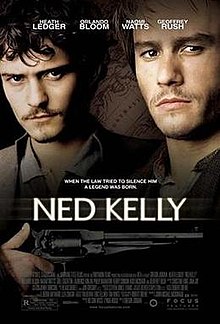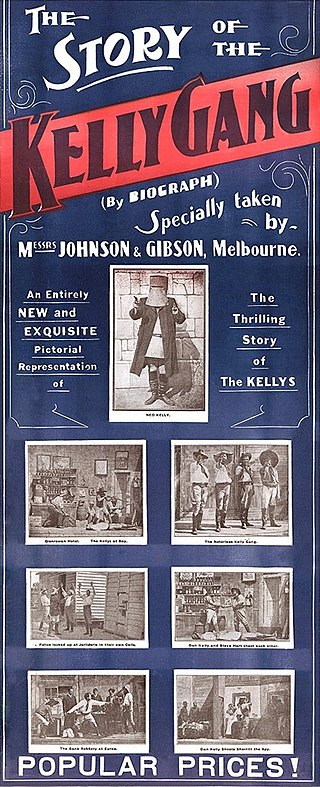Plot
After saving a young boy from drowning and being awarded a "hero sash" at the age of ten, Ned Kelly grows up in the colony of Victoria where he was born. The son of a Catholic Irish settler, he lives with his widowed mother Ellen, his younger brother Dan, and his two younger sisters Kate and Grace. Ned's best friend Joe and Dan's best friend Steve are also often at the house. One day in 1871, when Ned is 17 years old, he sees a white mare grazing alone in the outback. He rides it into town to impress a local girl named Jane. He is arrested, charged and convicted, and imprisoned for stealing the mare. But it was stolen by Wild Wright, an aquaintance.
After Ned is released and returns home three years later, he starts helping his family with their small horse-breeding farm located near Beechworth. He takes vengeance on Wild Wright by beating him in a bare-knuckle prizefight. He befriends Julia Cook, the beautiful wife of a wealthy landowner who lives nearby.
One night at a bar, a local constable named Fitzpatrick is harassing Ned's sister Kate. When Ned intervenes, hostilities erupt with Fitzpatrick and his fellow officers. To get back at Ned, they take the Kellys' horses, but with the help of his brother and their friends, Ned steals them back.
Some nights later, while Ned and Julia make love in the Cooks' stables, Fitzpatrick shows up at the Kelly farm and asks to see Kate. When she rejects him again, he tries to arrest Dan for horse stealing, invoking non-existent warrants for him and Ned. In the ensuing fight, Fitzpatrick is wounded, and falsely reports that Ned Kelly shot him. The police retaliate by arresting Ned's mother.
Ned asks Julia to testify he was with her the night Fitzpatrick was at the Kelly's farm. She refuses, saying that she would be disgraced by the acknowledgement of their affair and her husband would take her children away. Ned, Dan, Joe and Steve become outlaws on the run. They later meet a patrol in the bushland and kill three officers in a shoot-out, although Ned tried to avoid casualties. During the following months the "Kelly Gang" avoids capture, living in the outback, and often going hungry. On one occasion, Julia gives them shelter at her farm while her husband is away.
A large bounty is placed on their heads. The government issues a decree allowing anybody to shoot them on sight without consequences. The gang rob two banks and burn the mortgage documents relating to selectors. They give the money from their robberies to poor families in need, and soon become acclaimed as folk heroes by the Victorian population. The media depict them as violent criminals.
Fearing widespread revolt, the Colonial Government sends in Superintendent Francis Hare to suppress unrest. He arrests many sympathizers, including Joe's childhood friend Aaron.
When the police promise they won't harm Joe and say they are only after the Kelly brothers, Aaron agrees to work as an informant. During a quick visit to Beechworth, Joe learns that Aaron has been seen talking with cops. The gang decide to feed him false information about their next heist, to test his loyalty. When they see a large group of constables heading to the bank Aaron was told about, they know he betrayed them. Joe kills him at his house.
Ned devises a plan to foil Superintendent Hare. The gang lures him by taking over the town of Glenrowan. They gather all the townspeople, most of whom are friendly to their causes, at the Glenrowan Inn, to better protect them in the upcoming fight.
In the meantime, they sabotage the railroad tracks leading into town, to derail the train on which Hare and his army of constables are travelling. They've also built metal helmets and plates of body armour to survive bullets. They count on the derailment to kill most of the constables and plan to capture Hare and exchange him for Ned and Dan's mother.
The derailment does not take place, and hundreds of officers lay siege to the inn late at night. Determined to go out in a blaze of glory, the Kelly Gang emerge from the inn and begin shooting, protected by their armour, but are forced inside again. The police advance on the inn, killing innocent civilians during the shoot-out. To buy time for the townspeople to flee, Ned exits and charges forward alone; shot in the arms and legs, he falls out of sight.
Near dawn, Joe is shot and dies inside the inn. Dan and Steve, down to their last bullets and knowing all is lost, commit suicide. Ned regains consciousness; gravely injured, he continues to fire at the police until he is overcome and they take him into custody. He is loaded onto the train to be taken back to face justice.
In the end, although 32,000 people have signed a petition asking the government for a pardon for Kelly, he is hanged at Old Melbourne Gaol on 11 November 1880.
Reception
In total, the film grossed $5,040,860 internationally, $86,959 in the United States and $6,585,516 worldwide. [2]
The film received mixed reviews. On the review aggregator website Rotten Tomatoes , 55% of 60 critics' reviews are positive, with an average rating of 5.6/10.The website's consensus reads: "More depth about the legendary outlaw would be welcome, but as it is, Ned Kelly is a reasonably entertaining Western." [3]
A review of the film comments "Heath Ledger gives a solid performance in the lead but Orlando Bloom and Geoffrey Rush are woefully underused." [4] BBC film reviewer Nev Pierce gave the film 3 out of 5 stars, stating "there is some impressive action, albeit great scenes rather than sequences", concluding with "a rousing, watchable western". [5] Jay Richardson from FutureMovies.co.uk stated "this is a competent and blandly enjoyable film with a solid central performance from Heath Ledger". [6]
Megan Spencer from ABC.net said, "Thankfully Ned Kelly is a very cinematic Australian film, the international and local cast and crew made the most of their $30 million budget. And some of the best sequences are due in part to Heath Ledger's well delivered internal dialogue voice over, giving an inner life to the musings of a troubled anti-hero". [7] Clint Morris, a reviewer from Film Threat , who gave the film 3 and half stars out of 5, said "It's an exciting movie filled with plenty of action, adventure, beautiful cinematography and best of all, terrific performances". He specifically praised Ledger: "Heath Ledger is fantastic as Kelly. He gives a very immersing performance, and has misshapen himself into the character. When he wears that infamous tin helmet in the finale, we actually feel that's the real deal." [8]
More critically, one review describes the battle for Glenrowan, with masses of police and civilian casualties, along with a lion and monkey, as "fictional nonsense". [9]



















